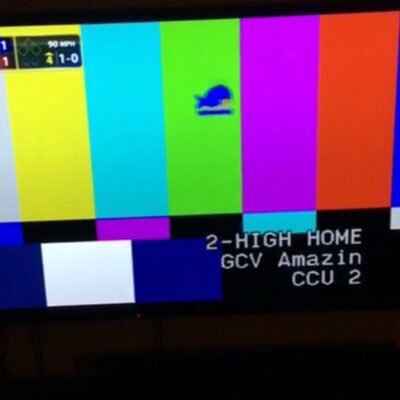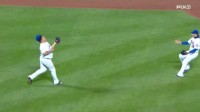Lucas Duda
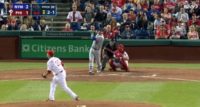
Last year, Lucas Duda hit 27 homeruns. He had a stretch where he hit eight homeruns in seven games. He hit seven homeruns in May, eight homeruns in July, and six homeruns in September/October. The other three months of the year, he hit 10 total. Many people have attributed this streakiness to Duda’s high leg kick.
Since 2012, various Mets hitting coaches have worked with Duda to work on reducing his leg kick. It appears this Spring, Kevin Long was finally able to get him to reduce his leg kick. Long also got Duda to take less batting practice. All of this is designed to make Duda a healthier and more consistent hitter. So far this year, Duda’s leg kick is much less pronounced.
For example, this was a homerun he hit in the NL East clincher:
https://m.youtube.com/watch?v=ZK-RlkIvrmc
Here’s a homerun he hit last night in Philadelphia:
It’s clobbering time! Lucas Duda went full #DudaSmash on his first home run of the season. https://t.co/ysZr0TY7fuhttps://t.co/C1UwEe7kHY
— New York Mets (@Mets) April 19, 2016
Now, after not homering in his first 10 games, he has homered in three straight games. It’s a long season, and you shouldn’t make judgments after 14 games, but Duda is once again hitting homeruns in bunches. It could be this is a small sample size, but it could also be that this is who Duda is. He’s a streaky homerun hitter.
If it’s as simple as Duda is a streaky homerun hitter that’s fine. Since Duda has become the Mets everyday first baseman, he has a .350 OBP. That means even when he’s not hitting homeruns, he’s getting on base. Additionally, looking at this lineup, the Mets don’t need Duda to carry them for stretches at a time. However, when Duda gets in a homerun groove he can carry a team.
The aforementioned stretch of eight homeruns in seven games coincided with the Mets sweeping the Nationals en route to the Mets taking control of the NL East for good. In that three game sweep of the Nationals, Duda hit three homeruns in nine at bats with five RBI. In that three game series, he hit .626/.667/1.875. When Duda gets hot, he’s scorching red hot. He can carry the Mets, and he can make a difference in the NL East.
Whether Duda’s streakiness will continue this year even with a reduced leg kick is besides the point. The only thing that matters is that Duda continues to be the good OBP first baseman that can carry the Mets for stretches. So long as he continues this, he will have had another terrific year.

When Sandy Alderson, J.P. Riccardi, and Paul DePodesta were first hired by the Mets, everyone assumed the Mets were going to be recreated in the image of the high OBP Scott Hatteberg Oakland Athletics teams.
However, upon reflection of what the Alderson regime has done here, the team has been more focused upon power than they’ve been on OBP. That philosophy was on display last year when Yoenis Cespedes came aboard, and it’s on display again this year:
17 HR by the @Mets in their last 5 games is their most in a 5-game span
Previous: 16 (last season)@EliasSports pic.twitter.com/4NuSWA4t65
— ESPN Stats & Info (@ESPNStatsInfo) April 20, 2016
Over the offseason, the Mets brought in three players to play everyday. There was the aforementioned Cespedes with his career .320 OBP. Cespedes also hit 35 homeruns last year while slugging .612 as a Met. Neil Walker has a career .336 OBP, but he averages 16 homeruns per year. He led all Major League second basemen in homeruns last year. Asdrubal Cabrera was signed to be the new shortstop. He has a career .329 OBP, but he did hit 15 homeruns last year.
That’s not to suggest the Mets do not value OBP. This is the same team that did choose Lucas Duda over Ike Davis, in part because Duda got on base more frequently. Rather, it shows the Mets put more emphasis on homerun power than OBP. The Mets aren’t looking to clog the bases and manufacture runs. Rather, they are looking for players that can change an inning or a game with one swing of the bat.
This shouldn’t surprise anyone.
Let’s re-examine that fabled 2002 Oakland Athletics Moneyball team. As we know, they actively sought out players like Hatteberg because they were undervalued and could get on base. That year, the Athletics ranked fourth in the AL and seventh in the majors in OBP. The same year, the Athletics ranked fourth in the majors (and the AL) in homeruns. While the Athletics no longer had Jason Giambi, one through nine, their lineup still had players that could hit the longball. The OBP got the headlines because it was a shift in how people viewed baseball, but the homeruns are what powered that Athletics offense.
The Athletics being powered by the longball wasn’t anything new or groundbreaking. It was what powered the Athletics when Alderson was the GM. From 1988 – 1990, the Athletics went to three World Series winning one. In 1988, the Athletics were ranked second in the majors and the AL in homeruns. Their rankings slipped in 1989 to seventh in the AL and eleventh in the majors, in part due to injuries like Jose Canseco‘s wrist, but the Athletics rose back up the ranks in 1989. In 1989, the Athletics were ranked third in the AL and fourth in the majors in homeruns.
Overall, Sandy Alderson, J.P. Riccardi, and Paul DePodesta have built teams that hit homeruns. Even if everyone expected different, this regime is doing what they’ve always done, and that’s building an offense based on their batters hitting homeruns. By the way, when they’ve successfully accomplished this goal, they’ve won a lot of games and went to the postseason.
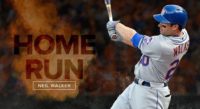
Thank goodness for PIP (picture in picture) technology. Because of that, I was able to watch both the Mets-Phillies game and Game Three between the Rangers and Penguins. By the way, if not for my wife and the Declaration of Independence, I’d propose getting rid of Pennsylvania a together.
In any event, the Mets did all people who were both Mets and Rangers fans a huge favor tonight by blowing out the Phillies and giving Rangers fans something to cheer about.
While the Phillies have terrific young starting pitching, we were reminded of the perils of relying on young pitching. While Vincent Velasquez has pitched incredibly well this season (including a terrific game against the Mets), he struggled against the Mets. The Mets jumped on him right away when Michael Conforto hit a two run homer in the first. It was not a good start for Velasquez who only lasted 4.1 innings allowing five hits, five runs (two earned), no walks, and four strikeouts. With the Phillies bullpen, the game was over once Yoenis Cespedes did this:
Watch @ynscspds do bad things to this baseball >> https://t.co/9FZRBHOap4. 5-0 #Mets! ?https://t.co/9ONhf9egGN
— New York Mets (@Mets) April 20, 2016
This was more than enough for Logan Verrett, who once again had a terrific spot start. Verrett would go six innings allowing six hits, no runs, one walk, and four strikeouts. He seemingly had someone on every inning, but he navigated how way through all the trouble.
Overall, it was the type of night you expected from a World Series contender against a team that’s expected to contend for the first pick in the draft. The Mets offense went off hitting six homeruns. Aside from the aforementioned homeruns, the Mets got homeruns from Lucas Duda, Curtis Granderson, and two from Neil Walker. Walker gave one a ride in the ninth but fell just short of a three homerun game. All told, the Mets would score 11 runs.
Things went so well, there was even a Rafael Montero sighting. Keep in mind, that was only after Terry Collins pitched Jim Henderson of an inning to protect the then 9-0 lead. As always, the seventh inning belongs to Henderson.
Montero wasn’t good. He allowed two hits, one earned, one walk, and two strikeouts. It would’ve been much worse if not for a Gold Glove play by Juan Lagares, who came into the game after the blowout started, robbing Maikel Franco of a homerun:
Juan doing Juan things. #Juanderful @juanlagares2https://t.co/a7kqGxuajP
— New York Mets (@Mets) April 20, 2016
Naturally, Collins gave the ball to Hansel Robles in the ninth to preserve the 11-1 victory rather than letting the long man Montero, who will soon be sent back to Triple-A, finish the game.
Right now, the Mets are beginning to get in a rhythm and are beating up on bad teams. It’s what they did very successfully last year. It’s what they’ll need to do in order to return to the postseason.
Game Notes: The Mets are back over .500 at 7-6. Every Mets starter got a hit, including Verrett, who had his first career hit. Verrett has not allowed a run in 12 innings as a starter. Travis d’Arnaud returned to the lineup after getting hit on the elbow on Saturday. The referees are still calling the Rangers-Penguins one-sided even as Sidney Crosby asks for the Rangers to get a game misconduct for giving him a mean look. Rangers trail the Penguins 2-1 in the series.
* photo from the Mets Twitter account
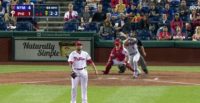
So far this season, two of the positive story lines, even when the team was really struggling was David Wright playing like the David Wright of old, and the continued development of Noah Syndergaard. Both were on display tonight.
Just like when Wright first came off the DL last year, he homered tonight in his first at bat in Citizen’s Bank Ballpark:
#DavidWright delivered an oppo ? in the first inning. #Metshttps://t.co/HIgn4DcI9E
— New York Mets (@Mets) April 18, 2016
He also made a nice bare-handed play in the field:
A little variation on vintage David Wright: https://t.co/Y2uGh85KEZhttps://t.co/Nx1yXyAIdS
— MLB (@MLB) April 19, 2016
The Mets needed Wright because once again runs were hard to come by against a Phillies starter. The Phillies young starters are very underrated. Tonight, it was Jerad Eickhoff. Once again, he showed a filthy 12-6 curveball. He would pitch seven innings allowing five hits, two earned, three walks, and nine strikeouts. He lowered his ERA to 1.89.
In the sixth, the Mets broke a 1-1 tie with a two out rally. Yoenis Cespedes would hit a triple, and he would score on a Lucas Duda RBI single. With Duda is struggling this year, he is hitting 4-10 with RISP. It was not the last time we would hear from Duda. For his part, Cespedes showed no ill effects from the bruised leg in the field on the basepaths.
The real mystery from tonight was how in the world the Phillies scored the one run. Syndergaard was throwing fastballs that appeared to be 101.9 MPH. His fastball was hovering around 100 MPH all night. His slider was hovering around 95 MPH all night. His change was around 90, and his curveball, or Thor’s hammer, was around 85 MPH. His stuff was once again practically unhittable.
Overall, Syndergaard pitched seven innings allowing five hits, one earned, two walks, and eight strikeouts. This actually raised his ERA to 0.90.
Once Eickhoff left the game, the Mets began to tee off against a terrible Phillies bullpen. In the eighth, Duda hit a laser to right field for his first homerun of the season.
Neil Walker would go back-to-back with an opposite field homerun to left. It was his fourth of the year. In the ninth, Wright would hit his second homerun of the game. Both were opposite field shots. They turned a tight 2-1 pitcher’s duel into a comfortable 5-1 win.
Antonio Bastardo pitched a scoreless eighth. Jeurys Familia came into a non-save situation. On the one hand, it could’ve been your typical closer struggling in a non-save situation. It also could’ve part of what has been, at least for him, a tough start to the season. Familia let up a single and double before settling down. He got the next three out, but not before allowing a run to score on a fielder’s choice. Fortunately, Familia finally shut the door before allowing a run preserving the 5-2 win.
The Mets are back to .500, and with a soft part of their schedule this week, the Mets look to be ready to take off.
Game Notes: The Mets hitters continue to strike out a lot. Tonight, they struck out 11 times. Mets have hit 23 homeruns in their last 11 games at Citizen’s Bank. Travis d’Arnaud missed the game with the bruised elbow. In the eighth, Juan Lagares was double switched into the game forcing Michael Conforto to the bench. The Mets allowed three stolen bases including two when Syndergaard was on the mound. It’s the one thing he doesn’t do well. In the fourth, when Duda popped out, a whale appeared on the screen:
The Mets hired Kevin Long as their hitting coach to help a team that wasn’t hitting. Subsequently, they hired Pat Roessler as the assistant hitting coach. Roessler was hired because of his previous relationship with Long. So far, they’ve worked extremely well together.
Long and Roessler work hand-in-hand to help the Mets batters. For example, they worked in tandem to help Lucas Duda hit lefties last year. It’s helpful to have another voice to bounce ideas of of when trying to help a hitter. When your message isn’t getting through, it’s helpful to have another voice to help deliver the same message. Having both coaches this allows Long to watch video between innings to see both his pitcher’s mechanics and how the Mets’ batters are getting pitched. It also allows Long to delegate Roessler to work with the pitchers on their hitting.
Perhaps it’s time the Mets add an assistant pitching coach to the staff.
This is no slight against Dan Warthen. He is in charge of what is the best pitching staff in baseball. He has not shown anything to lead you to believe his message isn’t getting through or that he should be replaced. With that said, wouldn’t it be beneficial for Warthen to have an assistant coach he trusts and feels comfortable working with help with the pitching staff?
Let’s take Matt Harvey‘s start on Saturday. For the first 4.1 innings, he dominated. Then the wheels came off. For his part, Harvey believes he’s struggled with his command since the season began. As reported by Anthony DiComo of MLB.com, Warthen believes it was as simple as Harvey falling into bad habits in a pressure filled inning:
“You get into a pressure situation, you do fall back into bad habits,” Warthen said. “Essentially, that’s what happened today. This has been Matt’s biggest bugaboo since I’ve had him.”
There are two important things to note here. First, Warthen knows the problem and the solution. Second, Warthen doesn’t know quite how to get Harvey to stop falling into the trap. Quite possibly, this is where a second voice could come into play.
One thing that can’t be discounted is perhaps Harvey was just lucky for the first 4.1 innings. For a player who averages 96+ MPH with his fastball, he was sitting at 94 MPH against the Indians. This is a player who averaged 9.5 strikeouts per nine coming into the season. This year he’s at 4.7, and his season high was the four he had against the Indians. It’s possible the mechanical quirk might’ve been perceptible to an assistant coach watching video in the clubhouse as opposed to a pitching coach watching from the dugout.
Now, the Mets do have a bullpen coach in Ricky Bones. However, he can only help so much. The bullpen coach primarily works with relievers and spends the game in the bullpen. Before and after games, he can be a sounding board for Warthen and/or another voice to help a struggling pitcher if needed. With that said, Bones job as the bullpen coach prevents him from running into the clubhouse to watch video of a pitcher’s last half inning to see the pitcher’s mechanics and his batters are approaching their at bats.
That job would best be done by an assistant pitching coach.
There’s another factor to keep in mind. Warthen is a 63 year old pitching coach with bad hips. He missed some time last year after being brought to the hospital with an accelerated heartbeat. No one knows how much longer he will want to or be able to stay on as the Mets pitching coach. As the organization clearly thinks very highly of Warthen, wouldn’t it make sense for him to groom his successor?
It’s time for the Mets to add an assistant pitching coach.
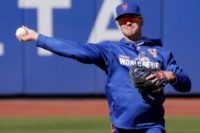
Due to the stress Jacob deGrom‘s injury and Steven Matz‘s short start out on the bullpen, the Mets were forced to call-up Rafael Montero to add a fresh arm to the bullpen. Rather than out deGrom on the DL or demote another pitcher, the Mets sent down Eric Campbell. Even with deGrom looking more and more like he will miss his next start, the Mets still won’t put him on the DL. Essentially, the Mets robbed Peter to pay Paul.
With a weekend Interleague series in Cleveland, the Mets can get away with a short bench. While it does limit their ability to pinch hit and make defensive substitutions, they should be able to navigate the situation because they won’t have to pinch hit for a pitcher. However, come Monday, they’re back to playing National League ball, and they’re going to need a full bench.
Whatever your feelings on Campbell is, he’s not going to be eligible to be recalled. Unless deGrom (or someone else) goes on the DL, Campbell will have to spend 10 days in the minors. Looking over the Mets 40 man roster, there would be three eligible candidates: Dilson Herrera, Matt Reynolds, and Brandon Nimmo. Now with one extra spot left on the 40 man roster due to Zack Wheeler being on the 60 day DL, the Mets could recall another player like a Ty Kelly.
In reality, the decision is between Reynolds and Kelly. Nimmo isn’t quite ready, and even if he was, the last thing the Mets need is another outfielder. Herrera still hasn’t started playing games in the field yet due to a sore shoulder, and even if he has been, the Mets see him as the second baseman of the future. They’re not wasting service and development time for him to be on the bench.
Kelly is 27 years old, and he has yet to play in the majors. He plays second, third, and the corner outfield positions. He’s a very disciplined hitter, who is extremely selective at the plate. For reasons that aren’t completely clear, he’s spent five seasons in Triple-A, and he’s never played a major league game. Overall, the truth really is Triple-A is his ceiling. At best, he’s a AAAA player.
Even if that assessment was wrong, it’s still not time to call-up Kelly. First, the Mets would have to add him to the 40 man roster and would not be able to denote him unless he clears waivers. Additionally, his skill set doesn’t match what this team needs. There’s no room for him in the outfield. Terry Collins is going to play Neil Walker almost everyday. So in essence, while Kelly has some versatility, the positions he plays do not match the Mets’ needs.
Accordingly, Reynolds is the player the Mets need to recall. During Spring Training and this early minor league season, Reynolds has played every infield position but first. His addition to the major league roster would create more flexibility across the infield. It would permit Collins to sit both Asdrubal Cabrera and Lucas Duda in the same game. Additionally, it would permit Collins to double switch with any player with the full knowledge that there’s another player on the bench who is fully capable of playing any position should another double switch be needed or there was an injury.
Offensively, Reynolds is a right hand batter who profiles better at the next level than Kelly. He’s not as patient as Kelly, but then again no one is. Reynolds profiles as a gap to gap line drive hitter. He does have more pop in his bat than Kelly. More importantly, at the very least, Reynolds projects as a bench player.
If Reynolds is going to wear a Mets uniform past smiling and waiving before Game One of the NLCS, he’s going to be a super-utility man in the mold of Flores or Joe McEwing. Reynolds has worked hard at it during the offseason and Spring. He knows this is his future, and he’s fully embraced it.
Better yet, he’s scorching hot right now. He’s hitting .353/.476/.529 with a homerun in five games. In those fives games, he’s played second, third, and short. At this point the only plausible reason for not calling up Reynolds is the Mets want to have a short bench.
Reynolds has earned his shot, and he’s playing well. It’s time for the Mets to call-up Reynolds.
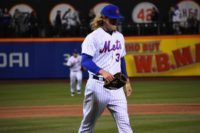
Tonight’s start by Noah Syndergaard was good. Why do I describe it as good? Because no matter what adjective you would pick to describe his start would be grossly underselling it, so you might as well just go with good. Too bad the Mets offense can’t even be described as putrid. Otherwise, Syndergaard and the Mets might’ve gotten the win tonight.
Syndergaard just dominated the Marlins like he did the Royals – like he’s going to do to the rest of baseball this year. Syndergaard went seven innings allowing seven hits, one earned, one walk, and 12 strikeouts. His ERA actually increased to 0.69.
However, as good as Syndergaard was, he still needed some help. Derek Dietrich would start the inning with a leadoff double, and he would wind up running the Marlins out of the inning. After a ground out and line out, Ichiro Suzuki singled to short, and Dietrich did a poor Eric Hosmer impersonation. Lucas Duda nailed him easily at the plate. Even if Ichiro would’ve been ruled out on replay, it was good to see Duda get some measure of redemption.
However, despite Syndergaard’s domination, the Mets still lost. They lost because the Mets still are not hitting or scoring runs.
The only run was scored on a Duda first inning RBI single. After that, it was pretty much nothing. At least tonight, they had the excuse of a dominant Jose Fernandez for five innings. Yoenis Cespedes gave one a ride in the third, but it was knocked down by the 29+ MPH winds blowing in from left field.
The turning point was Dee Gordon‘s eighth inning sixteen pitch at bat against Jim Henderson. Gordon would single to left. Henderson would walk two of the next three to leave the bases loaded. Henderson just lost his control, and he almost hit Giancarlo Stanton in the head. Jerry Blevins came into the game, and Don Mattingly used Martin Prado to pinch hit. Prado would get the game winning sac fly, and the Marlins would win 2-1.
The Mets have now lost four in a row and are 1-4 at home.
Game Notes: Terry Collins allowed Michael Conforto to hit against a lefty with runners on first and second with one out in the sixth. He grounded into an inning ending double play. Cespedes had another good night at the plate going 1-3 with a walk. Collins ignored the fact that Henderson is playing his first full season since shoulder surgery:
Jim Henderson with his career-high 34th pitch. And it's a walk to load the bases with one out. TC to the bullpen.
— Adam Rubin (@AdamRubinMedia) April 13, 2016
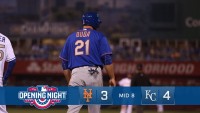
Aside from the fact that Curtis Granderson didn’t hit a homerun, Opening Day sure felt like a repeat of the 2015 World Series. As the late Yogi Berra would say, “It’s déjà vu, all over again.” We had the following:
- Yoenis Cespedes failing to make a routine play in the outfield leading to a run;
- A good Matt Harvey effort getting wasted;
- The Royals taking advantage of a poor Mets defense;
- Michael Conforto being really impressive; and
- The Mets losing.
For all the debating over the course of the offseason regarding Terry Collins leaving in Harvey, we got a taste of what Game 6 would’ve looked like. It wasn’t pretty. It really highlighted what the Royals did well, and the Mets did poorly.
The main difference between these teams is fundies (as Keith Hernandez puts it), defense, and a little bit of luck. Cespedes drops an easy out off the bat of Mike Moustakas, and he later scores on a single past Asdrubal Cabrera, who showed off his limited range at short on the play. Eric Hosmer‘s bunt stays fair while Juan Lagares‘ goes foul. Yes, it would lead to a run. Alex Gordon hits one off the end of the bat falling just out of the reach of Lagares to score a run. It was as frustrating as the World Series.
Since the Mets lost, let’s start with the bad. Mainly, it was David Wright. He couldn’t hit a fastball. He was 0-4 with a walk and two strikeouts. The last strikeout was in the ninth with the tying run on third. He made a couple of plays in the field, but he was able to get absolutely nothing on his throws. While it’s still early, and you don’t want to overreact to anything. However, with Wright’s back, I’m not sure it overreacting.
Also, the home plate umpire wax terrible. He was calling strikes in the area where Noah Syndergaard goes when he’s standing 60′ 6″ away, but over the plate was called a ball. Even worse than that was the ESPN brand new telecast. They delayed the start 40 minutes for an already late 8:00 start. They did inane segments like “The Mendoza Line” and Aaron Boone imitating batting stances. Even better, there were all-in on the Royals. When the Mets got something going in the 8th, they were being Royals-esque.
This is also Opening Day – a time when anything is possible. A time when we are supposed to be full of hope. There were definitely reasons for hope.
Harvey was good. The stat line wasn’t pretty with him allowing four runs (three earned) with eight hits, three walks, and only two strikeouts in 5.2 innings. However, his stuff looked good, and he really wasn’t helped by his fielders.
Conforto was 2-2 with a double and two walks. Last year was a fluke. He’s a much better player than he showed he was last year. Another good sign was the Mets offense that was asleep for almost all of Spring Training, woke up in the 8th and made it a game. The rally was highlighted by a Lucas Duda two run bases-loaded RBI single.
Sadly, the 8th inning rally fell short as the new double play combination make the outs killing the rally. In the ninth, we yet again saw Wade Davis and record the save, stranding the tying run on third, and locking down the 4-3 win. It was as frustrating a loss as you could’ve imagined. However, the Mets can build off of this. There was nothing you can point to tonight that would make you believe the Mets aren’t World Series contenders.
It’s time to dust themselves off. Continue to work on things during their off day, and go to the next ace in the fold in Game 2.
